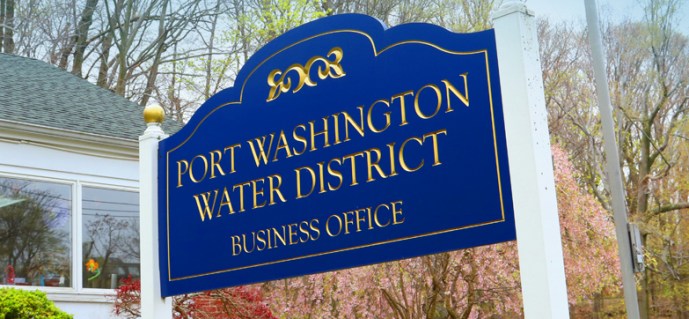Officials from the Port Washington Water District implored residents to conserve water this year due to an increase in water pumpage throughout Long Island from lawn irrigation and wasteful residential water usage that has caused water bills to nearly triple from last year.
With summer being the peak season for water usage, the officials said in a release last week that shoreline communities, such as Port Washington, require even further conservation to prevent wasteful water usage and save homeowners money. In shoreline communities, they said, saltwater intrusion into residential water sources becomes more likely to occur.
“We typically see a great deal of unnecessary strain on our water source during the warmer months, something which most residents do not realize,” said David Brackett, one of three district commissioners. “There are many simple steps that our neighbors can take to ensure that they are conserving water around their homes and help us avoid or minimize the use of wells impacted by emerging contaminants while treatment systems are being constructed.”
Officials said water pumpage has increased this year by 22.1 million gallons, or 17 percent, throughout the island compared to last year, with half of all water pumped wasted as a result of inefficient and wasteful irrigation habits. District officials also reminded residents that conservation is even more paramount as three well sites remain offline to treat emerging water contaminants, including 1,4 dioxane, a carcinogenic contaminant recently banned by the state.
Last year a daily rate increase of approximately $0.08 for residents went into effect throughout the district. The rate hikes for residents were part of a five-year, $43 million capital plan to prevent 1,4 dioxane and other emerging contaminants from entering residential water sources along with other infrastructure improvements that officials said were needed.
Included in the new treatment systems were new technology such as an Advanced Oxidation Process and a Granular Activated Carbon filtration system. The two together are the only approved method to remove 1,4 dioxane from drinking water, according to officials.
“Every additional dollar of revenue coming to the district is being reinvested into our community’s water system so we have the infrastructure in place to serve our residents with the highest quality water for generations to come,” fellow District Commissioner Peter Meyer said.
Officials said one of the best ways for residents to conserve water is by installing a smart irrigation controller, which connects to local weather stations and adjusts watering tendencies based on the forecast. The controller, officials said, prevents overwatering in lawns and allows residents to monitor watering habits to see what is truly necessary.
The district’s Smart Controller Rebate program offers residents who make the switch to the new system with $150. Residents throughout the district will be required to make the switch to a smart controller by Jan. 1, 2025, according to a new ordinance passed by the district earlier this year.
“Installing a smart controller is the best thing they can do to lessen their demand while also saving themselves a significant amount of money on their third-quarter billing,” District Commissioner Mindy Germain said. “We encourage residents to enroll in our rebate program as soon as possible.”
Upgrading to more technologically advanced irrigation systems has also been introduced to the Village of East Williston. The program to upgrade East Williston’s meters involves both cellular and noncellular technology, Bonnie Kreisman, secretary to the Board of Trustees, said last month.>
“It is old-fashioned, outdated, antiquated technology,” East Williston Mayor Parente said of some of the meters that were installed in the 1950s. “Like all of our surrounding municipalities – who for several years have had meters that you could read remotely outside of the home, not necessitating residents to be home and make appointments – we felt the need to catch up to modern technology.”
East Williston Village residents could face hundreds of dollars in fees if they choose to opt out, officials said.
County watering ordinances also instruct residents on the best time to water their lawns effectively without putting an excess burden on the water system. According to the ordinance, even-numbered homes can water on even-numbered days and odd-numbered homes can water on odd-numbers days. Additionally, no watering can be done between 10 a.m. and 4 p.m. any day.

